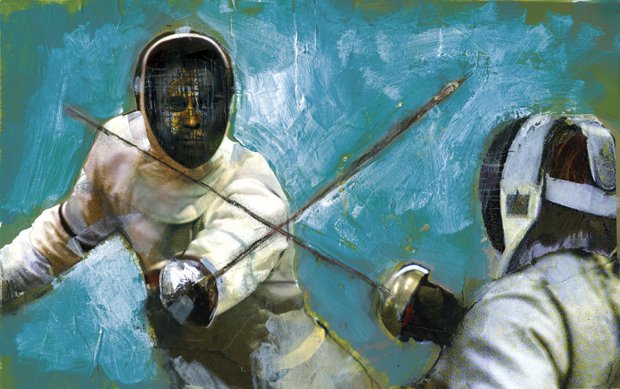No longer just the province of seedy bars and places of ill repute, the game of billiards is experiencing a revival—and finding a new crowd eager to chalk up and aim for the corner pocket.
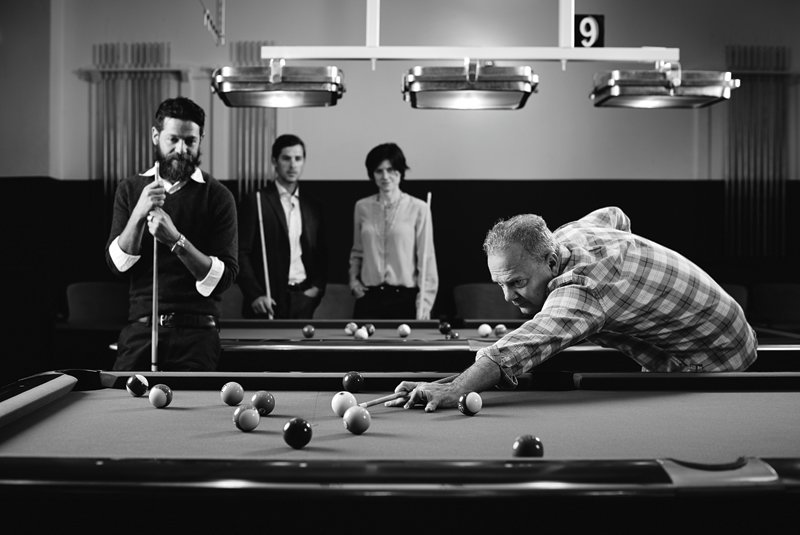
Gottier and Ball shooting pool with Jesse Rice and Brian Beckstoffer.
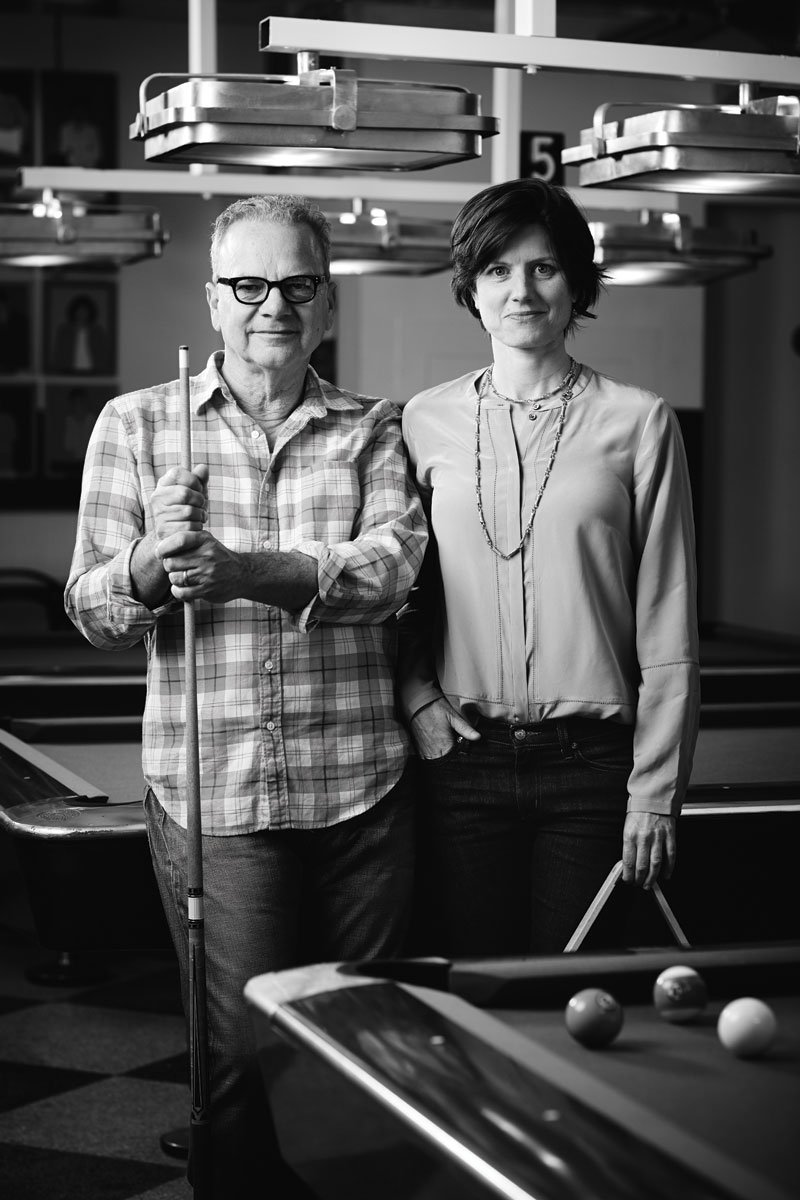
Greenleaf’s Pool Room owners Jim Gottier and Andrea Ball.
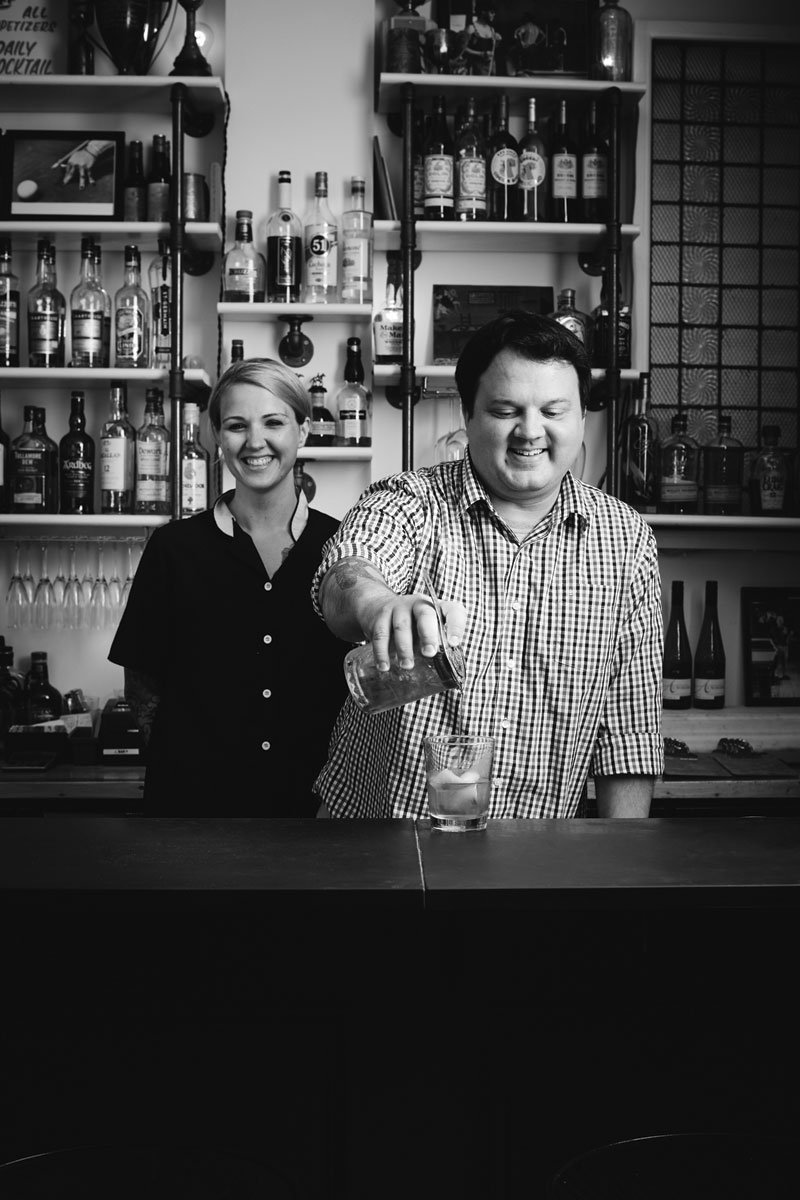
Bartender Dave Thomas and chef Hannah Pollack behindthe bar at Greenleaf’s Pool Room in Richmond.
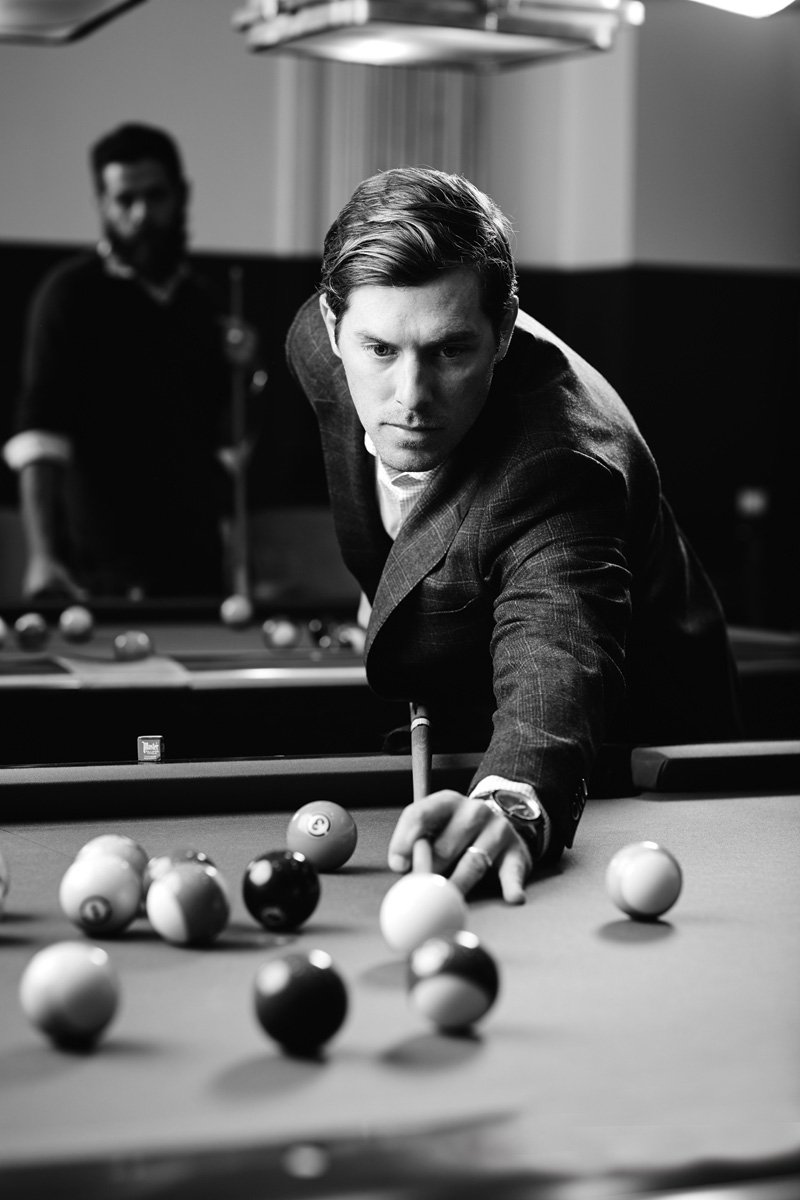
Brian Beckstoffer.
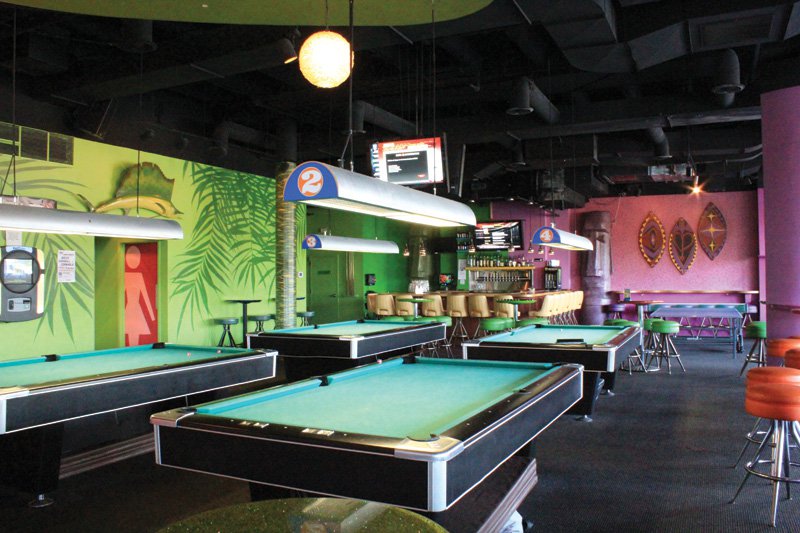
The Continental Pool Lounge in Rosslyn is decorated in a retro, tiki-bar style, complete with masks and swordfish mounted on the walls.
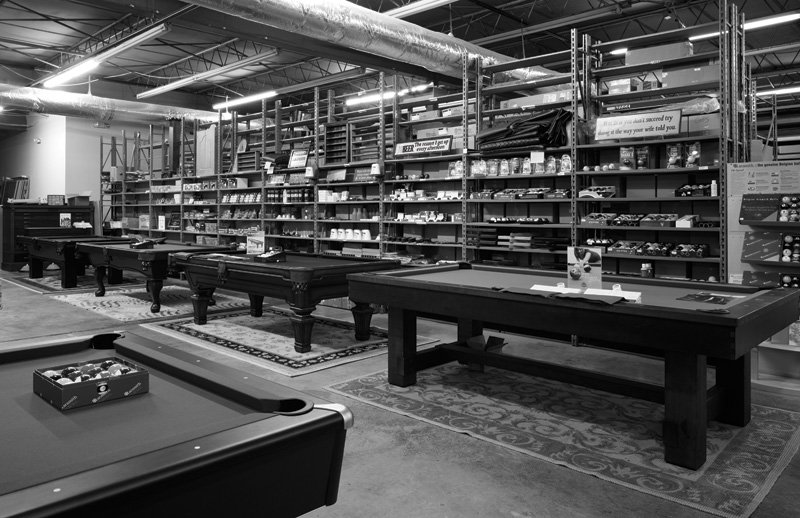
C.P. Dean billiard tables at the company’s warehouse in Richmond.
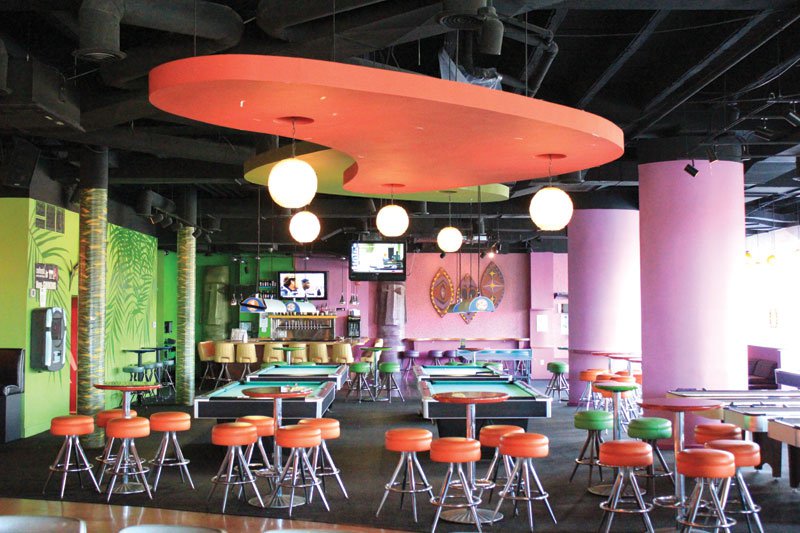
The Continental Pool Lounge.
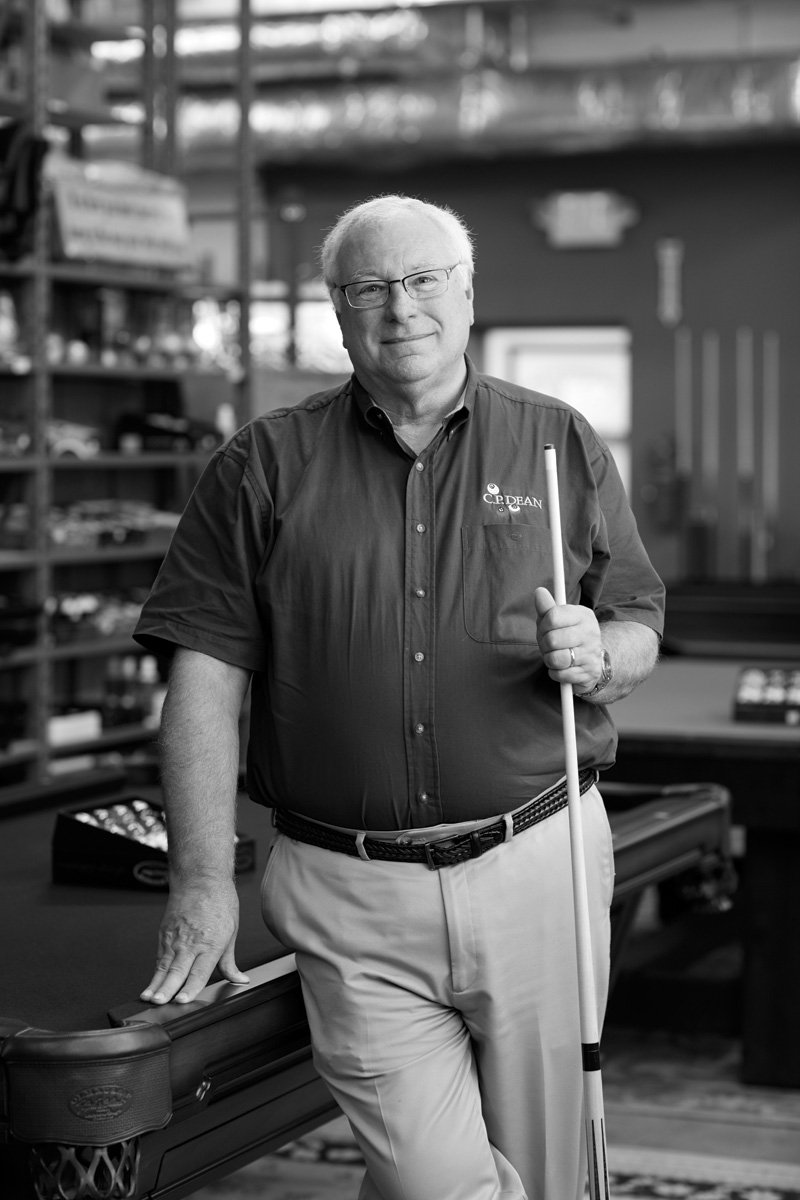
Bill Selden, owner of C.P. Dean.
It’s happy hour at the Continental Pool Lounge in Rosslyn, and Will Orr, a 20-something from North Carolina, is working on his nine-ball game. He’s shooting by himself in a room off of the main bar where boisterous revelers surround other pool tables. Orr, who is in town visiting Arlington Cemetery with his grandfather, says he has only been playing pool a couple of years, “but can’t put the cue stick down.” He’s been at the Continental every night since his arrival.
This isn’t one of those dark, quiet, smoky, after-hours joints Americans came to know and love, if only vicariously, watching Paul Newman in The Hustler and then again with Tom Cruise in The Color of Money. Tastes change, as the Continental suggests. There’s a retro Disneyland look here, with Sputnik-era “spaghetti lights,” sparkly bar, Tiki masks as well as arcade and video games and sports playing non-stop on the bar TVs.
“We made a decision not to go halfway with the décor,” says Curt Large, who opened the Continental in 2003 and also owns bars in Austin and Philadelphia. “We’re not just a pool hall. We’re a place to go for food and drink and games as well.”
Like Large, Jim Gottier and Andrea Ball, who opened Greenleaf’s Pool Room in Richmond in August 2014, have given considerable thought to the design of their establishment. This is not surprising, since they met in college as art history majors. He is known as “Carpet Jimmy,” a nickname picked up during his days as a dealer in antique rugs in New York; she’s a tax attorney with a Manhattan law firm who works from their home in Church Hill.
Gottier loves to talk about the “aesthetics” of a game he got hooked on as a teenager in his native Pomona, California. “Andrea and I wanted to design something beautiful, a pool hall that harkened back to the great old pool halls of the past,” Gottier says. They named their place for Ralph Greenleaf, a 20-time World Pocket Billiards Champion in the 1920s and ’30s, whose 1950 New York Times obit called him the Babe Ruth of billiards.
“We wanted it to be elegant but friendly, in a way that encourages newcomers to appreciate the beauty of the game and its romance.” By all evidence, they have succeeded. Occupying what had once been three floors of retail space behind the John Marshall in Richmond’s old downtown, Greenleaf’s design shows remarkable attention to detail. The old-time spectator chairs, for example, were crafted by Strong Oaks woodshop in Front Royal; slats from the tables at a defunct Richmond pool hall were repurposed as bar rails. The overall effect is sunny but subdued, and welcoming in a laid-back way that clearly appeals to hipsters just taking up the game. This isn’t a sports bar; the draw here is pool, but pool with quality food for players and for a growing downtown lunch crowd.
“We wanted to bring back the glamour of the old pool halls that weren’t dirty or smoky, and always had a luncheonette,” says chef Hannah Pollack. “Wherever we can, we locally source the food, which is made on the premises, including our ice cream sandwiches, which we sell at the South of the James Market.”
“We specifically designed this place to bring in a new generation, a new clientele,” Gottier says. “We wanted to attract young professionals—young people and young couples who live downtown. We are appealing to people who want something to do when they go out other than just sitting in a bar and drinking and looking at a screen. Playing pool gives them something fun to do,” and they can drink a “first-class cocktail,” he adds.
Billiards for today’s generation is a little like the ukulele. It is just offbeat enough to attract the attention of the curious, but has never exercised the kind of broad appeal that would make it catch on with the masses. Both the sport and the musical instrument enjoy periodic spikes of popularity, occasionally seem about to perish from inattention, and then keep coming back.
There was a time—in Virginia, especially—when you didn’t have to look far to find a pool hall. There were 420,000 pool halls in America in the 1920s. Many of these establishments had 50 tables in them. By 1950 or so, for reasons both economic and sociological, that total of 420,000 had dwindled to 85,000. Today, the Billiard Congress of America can account for some 1,500 pool halls, defined by the group as locations with at least four tables. No one is sure exactly why the number has declined so dramatically, and writing off the demise of pool halls to video games, short-attention spans and post-modernity in a general sense seems facile.
This dip in popularity in pool or billiards (Americans use the terms interchangeably) might have surprised the proprietors of Virginia’s great plantations, who eagerly imported from England a game whose Official Rules and Records Book says “has been played by kings and commoners, presidents, mental patients, ladies, gentlemen and hustlers alike.”
Ancestors of the cavaliers who settled Virginia had played pool at least since the late 16th century. Shakespeare mentions the game in Antony and Cleopatra, and the first official rule book, published in 1675, said, “Few [English] towns of note hath not a publick Billiard-Table.”
The game seems to have originated when Europeans sought to move a lawn game similar to croquet indoors; the green cloth on the tables was to simulate grass. The word “billiard” is from the French, referring to the “billart,” the stick used to move the “bille” about the table, or the bille itself. “Pool” in England simply meant a bet, or ante. A pool room was a betting parlor, with tables installed to give horseplayers something to do until the next race.
Ned Polsky, a sociologist (and pool shark himself) did a splendid job explaining the sport’s strange allure in his 1967 Hustlers, Beats and Others. “Billiards entered America as ‘the gentleman’s game,’” he wrote, and tables (originally 6 feet by 10 or 12 feet, unlike the 4 ½ feet by 9 feet tables we are familiar with today) were found in England’s great country homes, beneath Canalettos and Van Dycks. Educated in England, William Byrd II installed a table at Westover Plantation, which he put to good and enthusiastic use. To the later amusement of archivists, Byrd once recorded in his diary (written in code) that on July 30, 1710, he enjoyed intimate relations with his wife. “It is to be observed,” Byrd wrote, “that the flourish was performed on the billiard table.”
Most prominent Virginians confined their tables’ use to employments they could more readily share with neighbors. George Washington’s “past-time was billiards,” according to a 1798 visitor to the home of the old general’s adopted granddaughter, Eliza Parke Custis. Washington had not chalked up for years, but “played each game better.” Sarah Nicholas Randolph, one of Thomas Jefferson’s great-granddaughters, said Monticello’s Dome Room was intended for billiards, though this wish was never fulfilled. The 4-foot skylight “would have illuminated the table perfectly,” John McLaughlin wrote in Jefferson and Monticello: The Biography of a Builder.
One of Southside’s richest men, James Cole Bruce declared his love of the sport with characteristic splash. Around 1844, he completed his 62,000-square-foot Greek revival mansion, Berry Hill, which today is a resort and conference center. Located about three miles west of South Boston in Halifax County, Berry Hill, like most plantation houses, was designed for the admiration and entertainment of guests. Up a half-mile, tree-lined lane stands the main house, with its eight massive columns. But it is flanked by two smaller replica buildings, each with only four columns. The one on the right, as you make your way toward the mansion, was what Bruce called the Billiard House, and devoted solely to the sport. “The table is gone,” says Leland Luck, Berry Hill’s resident historian. But, “Guests can stay overnight in the Billiard House, which has been converted into a suite.” None so far report the click of balls, but given pool’s long and storied history, it wouldn’t be such a surprise if they did.
Virginians of the scruffier “middlin’ sort” enjoyed the game too. Every town had at least one pool table in its tavern, and toward the end of the 18th century, the English architect Benjamin Latrobe noticed that Hanover Town, with just 23 citizens, supported two public tables “at which it is impossible for the mind to catch the most distant entertainment or improvement.” The Irishman Isaac Weld expressed comparable disapproval. “Perhaps in no place of the same size in the world is there more gambling going forward than in Richmond,” Weld wrote. Pool tables “are always crowded,” and “indeed throughout the lower parts of the country in Virginia …. there is scarcely a petty tavern without a billiard room [which] is always full of a set of idle low lived fellows, drinking spirits or playing cards, if not engaged at the table.”
While upper crust Americans imported billiards “with no stigma attached,” Polsky found, poolrooms have “always had ‘middle class morality’ very strongly against them.” Public rooms became hangouts for men with nothing else to do, and centers of gambling and other vices. This in turn has led to repeated efforts to “clean up the game,” or at least make it acceptable to sufficient numbers to carry forth the tradition of a deeply satisfying and, at best, elegant way to waste one’s time.
Bill Selden was playing pool when he had to stand on a box to see over the rails. The legendary pool shark Luther “Wimpy” Lassiter was a family friend. “Lassiter spent a lot of time in Norfolk, when it was an ‘action’ town for pool players,” says the 67-year old Selden. “He would stay at our house, and he was good to me. He taught me how to hustle.” After graduating from the University of Virginia, where Selden made spending money hustling at Charlottesville’s now-defunct Van Liers, he came home to Richmond and went into the family business.
The family business is C.P. Dean, which has sold and serviced pool tables since 1886. In 1903 Selden’s grandfather bought the company from its founders when it was a woodworking shop, making bank fixtures and bars. “Prohibition killed the bar business, and the crash of 1929 killed the bank-fixture business,” says Selden. “That left pool tables.” C.P. Dean sells about 350 tables a year. Its hottest market for expensive tables (Selden sold one for $35,000) is Albemarle County, with its celebrities, nouveau riche and old money associated with the horsey set. Selden has sold tables to Sissy Spacek, among other movie stars, and Seagram’s mogul Edgar Bronfman Sr.
The “pool table business is thriving. It has just shifted from selling to wholesale—selling to pool halls—to retail, to private homes,” explains Selden. In the 1970s, when Americans started building larger houses, there was often a family room where people installed pool tables. “That’s where a lot of people learned to love the game—or they would play in one of the few good pool halls and then want a table for their home,” he says. “That’s why Greenleaf’s here in Richmond is so encouraging. Greenleaf’s is setting a high standard for everybody else wanting to open a pool room.”
Marty Kresovich would probably play pool even in a joint that served day-old McNuggets. A retired firefighter in his 60s, Kresovich comes into Q-Master Billiards in Virginia Beach several days a week, sometimes just to sit in the “private room” and watch others play. “This place is the real deal,” he says. “It’s got better equipment than most pool halls, and the equipment is better maintained.”
Located between a Big Lots and a Chinese carryout, Q-Master calls itself “the largest pool room in America,” and, with its 73 tables, it just might be. Once home to the U.S. Open pool tournament, it draws a lively and diverse crowd, who congregate to shoot stick, as they say, with few distractions. Q-Master seems to have retained its gritty authenticity without even trying. (Places like the Continental and Greenleaf’s will always coexist with, and never completely replace, the rougher establishments we so often associate with a sport on which so much money has been won and lost, even in driblets.) You can smoke here and, it appears, gamble some, but still, there are rules. A sign from management says the establishment has a “reputation for a quiet and soothing atmosphere,” so “try not to be distractive.”
The private room is for “regulars who kind of live here,” says Chris Fegley, one of the managers. “There used to be more action in pool halls in the 1960s and 1970s, but the Internet changed all that,” Kresovich says. Today, when a mysterious stranger shows up wanting to play, potential opponents Google him, find out where he’s from, what his game happens to be and how good he is—so it is more difficult for a newcomer to hustle the regulars. Right now in the elevated grandstand overlooking the tables, Kresovich is watching two other regulars play a seemingly endless one-pocket match, absorbed in every stroke, scratch and safety.
One-pocket is a confusing game to anyone who is not a serious pool player. Each player must confine his shots to a single pocket. It’s a defensive specialist’s game, with opponents taking great pains to block the other player’s pocket. Over the course of half an hour, the two combatants Kresovich is watching have pocketed maybe two shots, and after each game pass what looks like the same $20 bill back and forth. No one is trying to clear the table, so to the uninitiated, who enjoy spectacular runs, this is baffling.
Back at Greenleaf’s, Gottier seems surprised that anyone would find one-pocket tedious. “One-pocket is beautiful, maybe the highest level pool there is. It’s like a chess match, only better,” he says. “You can spend a lifetime trying to learn how to play pool and only scratch the surface.” That’s why it’s so addictive—and why it will endure.
This article originally appeared in our October 2015 issue.






